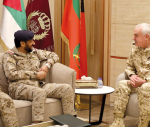You are here
Diplomacy, not militarism
Sep 18,2014 - Last updated at Sep 18,2014
For some time now, the Obama administration has been consistently favouring diplomacy over the military approach to Middle Eastern issues.
This position, however, seems to be shifting; if such is the case, this bodes ill for all.
Those who see the shift happen cite as evidence the Obama administration’s recent formation of a coalition to fight the so-called Islamic State.
They also go a step further, to pinpoint what they see as the reasons compelling the US administration to act in a manner counter to its declared policy of diplomatic engagement.
One reason, resulting from pressure by hawkish American politicians, such as Senator McCain and others who would like to drag America into conflicts for dreams of grandeur or interests of their own, is that the administration has failed to deal “decisively” with “evil” forces and America’s “enemies” in the Middle East region.
It has also failed to stand up to Russia, which succeeded in keeping the Syrian president in power, and has let down the Ukraine, leaving it an easy target for Russia.
By doing so, the argument goes, the administration has harmed America’s image abroad, depicting it as hesitant, confused and weak. It has also emboldened and strengthened America’s enemies.
Taking this and the elections coming up in November into account, the Obama administration is shifting to the military approach in order to both project a stronger image and help the Democrats win.
Another reason given is that America is using the recent barbaric beheading of the two US journalists as a pretext to start a new war in the region, this time without boots on the ground, in order to gain a host of objectives: guarantee access to gas and oil fields, sell more weapons to rich Gulf countries, fight and perhaps topple the Syrian regime, curb Iran’s influence, stand up to Russia and China, etc.
Some add to this the fact that America and Israel are always accomplices. Therefore, by starting a new war in the region, attention will be diverted from peacemaking in Palestine, keeping the Arab “enemies” of Israel busy and divided and enabling Israel to swallow more Palestinian territory and consolidate its influence in the region.
Many are saying that fighting IS is not really the target. One hopes this is not true.
America’s image cannot be served by resorting to militarism and force. A tough America does not inspire awe and “respect”. Reckless military actions, such as the war on Iraq, damage rather than help America’s image.
Instead of eliciting awe and respect, they stir animosity and hatred. Additionally, force does not solve problems. It actually promotes and causes more problems. Violence only leads to more violence, including against the US.
IS and other terrorist and extremist groups are, in fact, a result of the resort to violence.
Many in this part of the world firmly believe that had the Arab Spring maintained the non-violent approach it started with, which ended up toppling several dictators peacefully, the Arab world would have been in a much better state today.
It is the resort to violence in Libya and other countries that brought about more violence, blood and chaos to the region — and kept the dictators.
The disastrous militarism we see in Libya, Syria, Yemen, Iraq and many other places now is the direct outcome of “tough” actions and force that Senator McCain and others want more of.
And politicians from the region and abroad who advocated and made the use of force possible are as much to blame for the bloodshed and the chaos as the extremists and terrorists who are practising it.
What this region needs is diplomacy, not militarism.
Unlike what some would have us believe, Obama’s policies in the region are not seen by people here as confused, wimpy or ineffective. Far from it.
The handling of the Iranian nuclear issue, which the war-thirsty Israeli prime minister wanted to be a cause of a war that he planned to wage, has been very successful.
More importantly, several Arab countries that saw Iran as a threat, see wisdom and value in opening up to Iran and cooperating with it, instead of antagonising it.
This is very good for the region.
The Obama administration’s handling of the matter of governance in Iraq is much better than the handling by the Bush administration, which occupied Iraq for years and was unable to come up with a government that at least seeks to engage all Iraqis.
Through deliberately excluding and alienating the Sunnis, the Maliki government made the emergence of IS possible.
And the Obama administration exerted admirable effort in trying to help the Palestinians and Israelis achieve peace; it failed because the Israeli government deliberately worked against such efforts.
Obama’s diplomacy cannot be blamed for that failure.
One does not mind, of course, military action against IS, which is evil, barbarous and a curse to the region.
But it should be, first, military action that weakens and eventually eliminates IS, not one that makes it stronger.
Second, such military action should not trigger a war that would last for a long time and bring more misery and chaos, like the war on Iraq and Afghanistan.
One hopes the Obama administration will resist pressure from all kinds of gamblers and opportunists in both America and the region, and stick to sustained engagement through dialogue and diplomacy.













